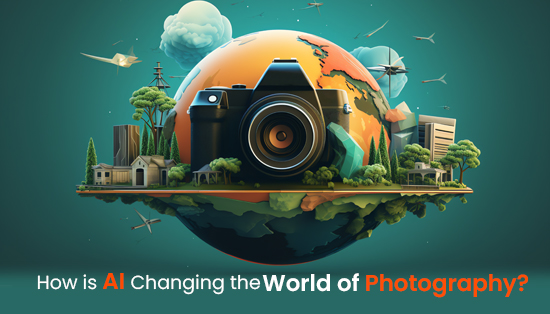How is AI Changing the World of Photography?
In a world where technology is evolving rapidly, one thing has been capturing our imaginations for over a decade: photography. But now, there's a new technology in the world, changing the game in different ways we never thought about. Artificial Intelligence (AI), the powerhouse behind the photography revolution, to give exceptional photography service experience. From creating extraordinary images to making our lives easier, AI is reshaping the world of photography to provide outstanding photography services. Let's delve into an incredible journey into the future of pictures!
Intelligent Composition
AI also helps photographers compose their shots adequately. Many advanced modern cameras and smartphone apps use AI algorithms to suggest simultaneous composition. These tools, identify subjects, examine the scene, and offer directions on positioning and framing, it makes easier for photographers to capture visually appealing photographs. For example, AI can help photographers cohere to the rule of thirds, stabilize elements within the frame, and suggest the best angles for capturing a scene to improve exceptional photography services. This makes it simpler for photography and motivates users to create more aesthetically appealing photographs.
escalate Image Quality
One of the ways AI impacts photography is through enhancing image quality. Before AI, photographers depended on manual editing, darkroom techniques, cropping, and specialized tools like lenses and filters to improve image quality. These methods demanded skills and time but had certain limitations. AI has transformed the field by expanding and automating these processes, making image improvement more accessible and well-organized for photographers of all levels to provide exceptional photography services. AI-powered software and cameras can process and capture images with precision and clarity. Features like noise reduction, image stabilization, and dynamic range optimization have become standard, ensuring that even beginner photographers can produce high-quality photos. For professional photographers, AI-driven cameras are a turning point. They can capture images in challenging lighting situations, such as low light or high contrast, precisely, which results in extraordinary, lavish detailed images that were previously hard to achieve without immense post-processing.
Automated Post-Processing
Post-processing was hand-operated and error-prone before Artificial Intelligence (AI). Photographers had to diligently adjust various aspects of their photographs, such as contrast, color balance, brightness, and saturation, through manual editing using software like Adobe Photoshop. This process is often time-consuming to achieve the desired output. before, traditional darkroom techniques were used for dodging and burning, and specialized tools such as physical filters and lenses were employed to gain specific effects. Overall, pre-AI post-processing calls for a high level of expertise and endurance, with photographers depending on their skills to improve the quality and appearance of their photographs. Editing software powered by AI now helps in performing functions like color correction exposure adjustments with minimal human interference. This automation rescues the photographer's valuable time and ensures consistent and extreme-quality outcomes. Because of AI Photographers can focus less on the technicalities of editing and more on their creative vision, resulting in quick turnaround times and more happy clients.
AI is certainly changing the world of photography, allowing exceptional photography services that were once the domain of expertise to become reachable to a wider audience. As AI progresses, we can look for even more amazing technological developments in photography. The AI future holds endless possibilities, from AI-driven drones capturing amazing aerial shots to increasing reality and improving the photography experience. For photographers and photography enthusiasts people, it's the road to unlock the full potential of their art in the digital age.




Comments
Post a Comment